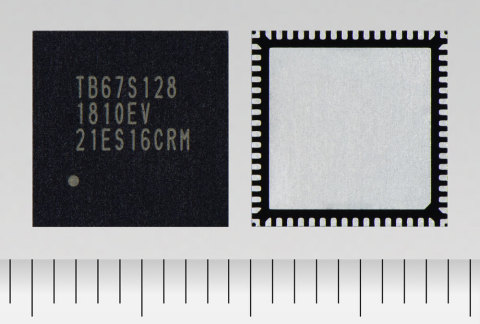TOKYO--(BUSINESS WIRE)--Toshiba Electronic Devices & Storage Corporation (“Toshiba”) today announced “TB67S128FTG,” a bipolar stepping motor driver with a 50V/5A rating and support for 128 micro steps. Sample shipments start from the end of this month.
High speed and high performance motor control and lower power consumption are required for applications that include 3D printers, office equipment, banking terminals such as ATMs, cash dispensers, amusement machines, and home appliances. To meet these conflicting requirements, Toshiba has applied its original current optimization technology, AGC[1], to a new motor driver IC that achieves a large current drive (50V/5A rating).
Recent years have seen increasing demand for equipment offering higher accuracy and quieter operation. Toshiba’s new motor driver IC realizes high accuracy and low vibration by delivering 128 micro steps, realizing a much higher definition than conventional 32-step devices. It also uses SMD[2], a current adjustment function, to reduce noise and vibration effectively during motor drive by selecting the SMD configuration best suited for each motor.
Use of another Toshiba original current detection technology, ACDS[3], reduces the number of components required for driver control, contributing to lower system costs and improved flexibility in board pattern design.
Main features
-
Reduced vibration and noise
A high accuracy drive is realized by high-definition micro stepping with up to 128 steps, which realized much lower vibration than 32-step products[4]. -
Support for high torque drive
Large current drive (50V/5A rating) supports higher torque operation. Heat generation is reduced by adoption of low on resistance (0.25 Ω). -
High efficiency motor drive and elimination of external components.
AGC technology prevents motor stalls and reduces power consumption, ACDS eliminates components, and ADMD[5] improves current following capability. -
Support for various I/F
CLK input or serial input can be selected according to the user’s signal source. Current can be controlled directly with the serial input. -
Built-in error detections
Thermal shutdown detection and overcurrent protection are incorporated. In addition, an open detection function prevents disconnection from the motor during assembly. When activated, they output error detection flags (ERR), ensuring equipment safety and highly reliable designs.
Applications
3D printers, surveillance cameras, electric actuators, home appliances (refrigerators and air-conditioners), industrial equipment (banking terminals, such as ATMs, office equipment, facsimile machines, etc.), game machines, such as slot machines, etc.
|
Main specifications |
||
| Product name | TB67S128FTG | |
| Control I/F | Supports either of CLK input and serial input | |
| Absolute maximum ratings | 50V, 5A | |
| Package | QFN64 (size: 9 mm x 9 mm x 0.9 mm, pin pitch: 0.5 mm) | |
| Other features |
High accuracy drive due to high-definition micro stepping (up to 128 steps).
Optimization of motor drive current control by AGC.
Improvement of current following capability by ADMD. |
|
| Mass production | Scheduled for the end of July, 2018. | |
Notes:
[1] AGC: Active Gain Control optimizes drive current to suit
required torque. A Toshiba technology that prevents stalls and realizes
power savings.
[2] SMD: Selectable Mixed Decay optimizes drive
current to suit the motor.
[3] ACDS: Advanced Current Detection
System controls motor current without any need for a current detection
resistor.
[4] Comparison with the current product "TB67S249FTG."
[5]
ADMD: Advanced Dynamic Mixed Decay automatically optimizes switching
control of Fast Decay and Slow Decay modes to secure high speed rotation.
For further information about the TB67S128FTG, please visit:
https://toshiba.semicon-storage.com/info/lookup.jsp?pid=TB67S128FTG®ion=apc&lang=en
Customer Inquiries
Mixed Signal IC Sales and Marketing Department
Tel:
+81-44-548-2826
http://toshiba.semicon-storage.com/ap-en/contact.html
Information in this document, including product prices and specifications, content of services and contact information, is current on the date of the announcement but is subject to change without prior notice.
About Toshiba Electronic Devices & Storage Corporation
Toshiba Electronic Devices & Storage Corporation combines the vigor of a new company with the wisdom of experience. Since becoming an independent company in July 2017, we have taken our place among the leading general devices companies, and offer our customers and business partners outstanding solutions in discrete semiconductors, system LSIs and HDD.
Our 19,000 employees around the world share a determination to maximize
the value of our products, and emphasize close collaboration with
customers to promote co-creation of value and new markets. We look
forward to building on annual sales now surpassing 700-billion yen (US$6
billion) and to contributing to a better future for people everywhere.
Find
out more about us at https://toshiba.semicon-storage.com/ap-en/company.html




